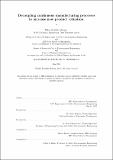| dc.contributor.advisor | Willems, Sean | |
| dc.contributor.advisor | Simchi-Levi, David | |
| dc.contributor.author | Morgan, Ellen Franklin | |
| dc.date.accessioned | 2022-01-14T15:20:21Z | |
| dc.date.available | 2022-01-14T15:20:21Z | |
| dc.date.issued | 2021-06 | |
| dc.date.submitted | 2021-06-10T19:13:20.429Z | |
| dc.identifier.uri | https://hdl.handle.net/1721.1/139566 | |
| dc.description.abstract | As competition floods the maturing contact lens industry, Johnson & Johnson Vision (JJV) seeks to differentiate itself by consistently introducing innovative, specialized products. While the company’s highly automated, continuous manufacturing platforms efficiently produce large volumes of core business products, these systems lack the flexibility to quickly scale new products and respond to changes in customer demand.
The goal of this thesis is to design a future-state manufacturing platform capable of supporting JJV’s shift toward a higher-mix, lower-volume product portfolio. Analysis focuses on redefining the manufacturing process for one new product, ACUVUE Theravision with Ketotifen (Theravision), a combination product that combines vision correction with anti-allergy medication. This work explores how decoupling continuous manufacturing processes can both increase valuation for Theravision products, and more effectively enable new products in the future.
Decoupling the manufacturing system would allow JJV to utilize existing capacity for common process steps and introduce more variety into their products, labeling, and packaging. Our analysis considers decoupling the current manufacturing system at three distinct locations. Each location was reviewed individually for its technical feasibility, organizational impact, and opportunity for cost savings. The resulting business case demonstrates an expected 22% capital reduction per manufacturing line, and a standard gross profit improvement of 8% for the Theravision product. | |
| dc.publisher | Massachusetts Institute of Technology | |
| dc.rights | In Copyright - Educational Use Permitted | |
| dc.rights | Copyright retained by author(s) | |
| dc.rights.uri | https://rightsstatements.org/page/InC-EDU/1.0/ | |
| dc.title | Decoupling continuous manufacturing processes
to increase new product valuation | |
| dc.type | Thesis | |
| dc.description.degree | S.M. | |
| dc.description.degree | M.B.A. | |
| dc.contributor.department | Sloan School of Management | |
| dc.contributor.department | Massachusetts Institute of Technology. Department of Civil and Environmental Engineering | |
| dc.identifier.orcid | https://orcid.org/0000-0002-1205-7202 | |
| mit.thesis.degree | Master | |
| thesis.degree.name | Master of Science in Civil and Environmental Engineering | |
| thesis.degree.name | Master of Business Administration | |
